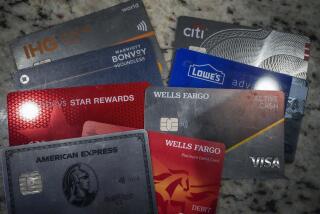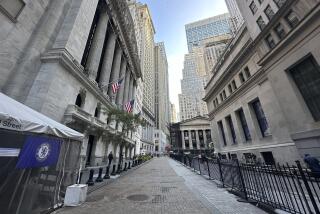Risks Get Riskier on Brink of Rate Shift
- Share via
Tenet Healthcare Corp. has few fans among Wall Street analysts. The hospital company could wind up paying a huge amount to settle legal challenges over its billing practices and alleged unneeded surgeries. Some analysts question the firm’s long-term viability.
But in the bond market, some people decided last week that Santa Barbara-based Tenet was a risk worth taking -- to the tune of $1 billion. That’s the cash sum Tenet got by selling new 10-year bonds to unnamed investors.
The total was double what the company had hoped to raise.
On Wall Street, the most coveted information is what the “smart money” is doing. When just two brokerage analysts rate Tenet’s depressed shares worth buying, while 11 advise selling, the vote of confidence by bond investors raises the question of who’s smart and who’s not. (Tenet stock closed Friday at $12.70; it was at $52 in 2002.)
At a minimum, investors’ willingness to buy Tenet’s bonds was an interesting move ahead of a major inflection point for the economy and financial markets: the beginning of a credit-tightening campaign by the Federal Reserve.
On June 30, the Fed most likely will raise its benchmark short-term rate to 1.25% from the current 46-year low of 1%.
On the face of it that wouldn’t be much of a bump, especially in an economy that is clearly humming. But if the Fed acts as expected, it will be making credit harder to get for the first time in more than four years. That’s a significant shift, however small the initial change.
And unless something goes seriously wrong with the economy soon, the Fed is just at the start of what could be a lengthy cycle of rate increases, many analysts believe. Their estimates of where the central bank’s key rate will be by the end of 2005 generally range from 2.5% to 4%.
Whenever the Fed reverses an easy-money policy, it forces investors to reconsider the risks they’re taking. Rising interest rates always reorder the economic and market landscapes.
A heavily indebted company, for example, may become more so as interest rates go up. Ditto for heavily indebted households.
Stocks often look more expensive, and thus less appealing, relative to higher rates.
Keeping cash in low-risk accounts, such as money market funds, may no longer seem such a wretched proposition.
None of this happens overnight. The shifts are gradual. And given that the Fed has been telegraphing for months that it was on the verge of raising short-term rates from generational lows, some reaction already has occurred in markets. Long-term bond yields have shot up since April, for instance.
Indeed, although Tenet succeeded in selling $1 billion in bonds last week, the company paid a high price: The bond buyers demanded an annualized interest yield of 10.25%. That is more than double what 10-year U.S. Treasury notes pay.
Because of its problems, Tenet is a “junk” borrower, meaning its credit rating is below investment grade. As long-term interest rates overall have risen this year, the average yield on an index of 100 junk bonds tracked by KDP Investment Advisors of Montpelier, Vt., has jumped from a record low of 6.55% in January to 7.78% now.
As credit becomes tougher to get, or at least more expensive, one effect is that the corporate herd gets culled. Weak companies may get weaker. The strong often get stronger.
Likewise, investors who have taken on excessive risk in their portfolios suddenly may wish they hadn’t. And there has been ample opportunity for people to boost their risk taking over the last year as optimism about the economy has blossomed.
“A lot of extreme situations have evolved in the low-interest-rate environment,” said Paul Kasriel, economist at Northern Trust Co. in Chicago.
One example: Many big investors have borrowed heavily at cheap short-term rates to buy long-term bonds paying higher yields. As short-term rates rise, that strategy becomes far less profitable. Worse, the investors’ long-term bonds drop in value because their yields are below what new bonds pay. The investors are squeezed on both ends.
Almost inevitably when the Fed is tightening credit, big blowups occur in markets. In 1994, when the Fed was on its way to doubling its benchmark rate to 6%, Orange County’s treasurer had structured the county’s bond portfolio in a way that bet rates would stay low.
As the portfolio sank in value, the county wound up in bankruptcy.
The Mexican peso and stock market crashed early in 1995, also casualties of rising rates.
In 2000, the three final Fed rate increases in a campaign that began in 1999 helped burst the technology stock bubble.
Some Wall Street pros have expressed surprise that there hasn’t been a well-publicized market casualty already this year as bond yields have surged.
“Anytime you’re in a new rate environment, somebody’s going to get hurt,” said Drew Matus, economist at Lehman Bros. in New York.
Many institutional investors have attempted to lessen the risk of rising interest rates by hedging -- using so-called derivative securities to put the risk on another investor, for a price. (Not unlike an insurance policy.)
Still, hedging is like playing the card game of Old Maid: Nobody wants her, but somebody has to be stuck with her. So it is with interest rate risk.
What’s more, while many big investors have become more intent on lowering their risk level in anticipation of higher interest rates and their fallout, some individuals appear to be taking on greater risk. Consider the home buyers who are desperate to buy in Southern California at record high prices, and with enormous mortgages.
Tenet, too, is taking a risk by borrowing money at current rates. But the bond transaction also is lowering the company’s risk in one respect: Some of the proceeds from last week’s sale were used to pay off $450 million in outstanding bonds that were to mature in 2006 and 2007.
Tenet is trying to give itself some breathing room as it seeks to negotiate an all-encompassing settlement of the lawsuits against it. The Times recently reported that a settlement of federal charges and other litigation could cost Tenet more than $1 billion. The company has declined to speculate on the sum.
But to make a payment of substantial size, Tenet has made clear that it would expect to go to Wall Street for financing, perhaps via another bond sale.
Which brings us back to the Fed and tighter credit: The ability of Tenet and other financially challenged companies to survive may depend on how high interest rates go over the next couple of years -- and how willing investors will be to take on new risks in that environment.
Tenet’s new bond owners must see a happy outcome. Much of Wall Street isn’t convinced.
*
Tom Petruno can be reached at tom.petruno@latimes.com.
More to Read
Inside the business of entertainment
The Wide Shot brings you news, analysis and insights on everything from streaming wars to production — and what it all means for the future.
You may occasionally receive promotional content from the Los Angeles Times.









